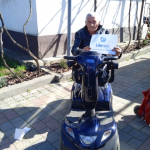December 15, 2023
What's it like to live in a large city under the constant sound of of air raid sirens and the threat of being bombed. I would like to share this experience from a person living in Kharkiv, Ukraine's second largest city, who writes this compelling account five months into the war and shares some photos.
My mother came from the Kharkiv region and that is why I'm particularly interested in this area. Some of my relatives still live there. Death from the war has come to our family. My second cousin Roman Simonok died in the rubble of a building from Russian rocket attack. His mother, my cousin, is Alla who is married to Sergei Simonok.
Currently my nephew Colin Kubik who graduated from college in Lviv last July still lives in that city. Even though Lviv is far from the front lines in the relative safety of the Western Ukraine, they have still had missile strikes. He is shown here teaching English in a bunker on a day when sirens wailed all day long.

My second cousin Roman Simonok who died in the rubble of Kharkiv apartment building after Russian rocket attack

My nephew Colin (right) teaching English to students in air raid bunker in Lviv this past week. Sirens have been wailing all day long.
From Alexander Zolotko:
When asked: "how are things in Kharkiv?"
You're going to bed. After reading a book, watching a movie or just drinking milk, you fall asleep. Because it's night. Because I want to sleep.
At two o'clock you wake up from the sounds of explosions and an air alarm. You lie down and listen to her howling. You should get up, get dressed, take an alarming suitcase and run to the bomb shelter. But you're lying down. Because the first two explosions sound even before the siren starts working, you still don't really have time to wake up. The alarm still requires you to flee to the shelter, and the missiles are already on the way. The alarm howls with despair, and two more missiles explode in a minute, one after another.
Close, you think, because an explosive wave hits cars parked nearby, and car sirens attach their squeal to the cry of air alarms.
You're lying in bed and thinking that's probably all. Usually four pieces arrive at night. And they explode in a row: bang-bang - pause in a couple of minutes - and again bang-bang. And silence.
You live in a quiet neighborhood, there's no barrel artillery here. And the missiles. Rockets can fall anywhere - both where you are now lying and where you can run, obeying the air alarm team.
The air alarm is silent. Then the car alarm stops. It's not here, you think, without feeling any feelings. You don't feel any feelings about night explosions, because they sound every night, and if you experience at least some emotions, you can go crazy. You would have gone crazy a long time ago. quickly. And so... It is possible that you are still going crazy, but slowly. It's not in a hurry.
You know how to do the right thing. You need to be ready to run out of the apartment, out of the house with a disturbing suitcase. Or a backpack. You realize perfectly well that in case of a close explosion or a direct hit, you will not have time to get dressed, but this means that you have to sleep dressed for five months. And you change into pyjamas every evening. Because if you want to react to an air alarm, you need to go to bed right in the shelter. Every night. Five months. Maybe someone can stand it, but you go to bed every night. You don't even hide behind two capital walls, because your apartment just doesn't have two capital walls.
Of all possible precautions, you do not leave the house during the day without documents and all your money in your pocket. But if you get an alarm outside the house during the day, you take note of it and continue to go about your business. And yes, the windows are glued with tape to cross on the cross.
The rocket from Belgorod flies to your house for 40 -100 sec. You know you won't be able to get to the shelter in that time. And you know you won't hear the rocket. And falling to the ground when you hear the alarm, it's kind of ridiculous. You recently learned that they are running out of ordinary missiles, and that now they are shelling your city with anti-aircraft missiles. They have fewer explosives, but much more fragments. And no accuracy. So she can fall anywhere.
You might think about it when the night explosions died down and the siren finally shut up. Or you don't have to think about it, because it's been five months since... Five months.
You're falling asleep.
At 4 a.m there's an explosion again, this time - a little further from your house, you realize it, because the car sirens are silent this time. And you fall asleep again.
In the morning you go online, trying to find out exactly where the arrivals took place at night. If the rockets have fallen into the neighborhoods where your friends live, you call them back, and when you hear the voices of friends on the phone, you don't have to ask how you're doing. They answered - it's okay.
You are making breakfast, coming up with tasks for the day. You cook, water the flowers, wash or clean the apartment.
You even make the bed every morning - you load yourself and your brain with something, because otherwise you can go crazy.
Then the day passes. The night is coming.
You're going to bed. After reading a book, watching a movie or just drinking milk, you fall asleep. Because it's night.
Because I want to sleep.
Five months. So far, it's only five months.
Author: Alexander K. Zolotko




